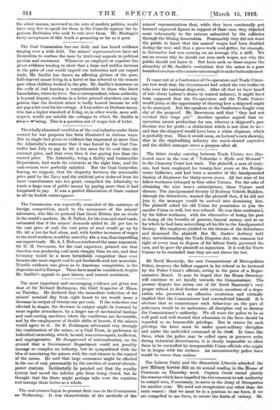The most important and encouraging evidence yet given was that
of Sir Richard Redmayne, the Chief Ir.spector of Mines; on Tuesday. He declared that the immediate reduction of the miners nominal day from eight hours to six would mean a decrease in output of twenty-one per cent. If the reduction was effected in stages, the decrease in output might be lessened by more regular attendance, by a larger use of mechanical haulage and coal-cutting machines where the conditions are favourable, and by the employment of double shifts of hewers. if the miners would agree to it. Sir R. Redmayne advocated very strongly the combination of the mines, or a Coal Trust, in preference to individual ownership, which, he said, was extravagant, inefficient, and unprogressive. He disapproved of nationalization, on the ground that a Government Department could not possibly manage so complex an industry, but he sympathized with the idea of associating the miners with the coal-Owners in the control of the mines. He said that large economies might be effected in the use of coal, presumably by the erection of central electric- power stations. Incidentally he pointed out that the royalty system had saved the Inferior pits from being closed, but he thought that the State might perhaps take over the royalties and manage them better as a whole.






































 Previous page
Previous page